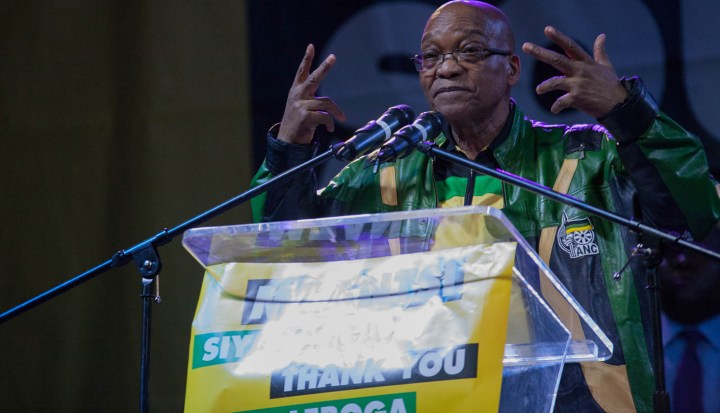South Africa
Op-Ed: How do we move towards an emancipatory politics in South Africa?

The news is bad, it seems. We need to recognise that, if where our politics is headed depends on tensions within the ANC, it cannot lead to an emancipatory politics. Even if President Jacob Zuma were removed, whoever replaces him operates within relationships and structures that have enabled abuse to become well established. By RAYMOND SUTTNER.
Steven Friedman correctly concludes (in Business Day, 9 May 2014) that the ANC may not face electoral defeat for the foreseeable future, though he, uncharacteristically, treats this as everything that may be entailed in the notion of politics. “What happens inside the African National Congress (ANC) remains more important to our political future than what happens outside it.” If we want a sense of where our politics is headed, he says, “we need to look at the tensions within the ANC rather than the challenges it faces from outside.”
‘Outside’, here, refers to other electoral parties, not the whole of the ‘outside’. It is important to define our understanding of politics and its scope. It may well be that some who voted ANC will be on the streets protesting today or in the near future. It is reported, for example, that the ANC scored 60% of the vote in the Bekkersdal hotspot.
Sections of the population are likely to continue to claim political space beyond electoralism, in a variety of ways. This is because ANC failure to honour constitutional obligations is unlikely to be remedied quickly. Indeed the organisation may be emboldened to do less following its convincing victory.
At a very patent and obvious level we have seen in the last few years that Parliament has failed to hold the state to account when it has committed one or other action that has caused loss of life, involved widespread corruption and other abuse. The ruling party, whatever may be said in its constitution, has ‘another life’, organised around various hierarchies, bound together through ties of patronage.
The support that President Jacob Zuma enjoys is linked to benefits that others derive and these bind still other people at various levels through benefits such as appointments or being awarded contracts where some person at a higher level in the hierarchy has a decisive say in their disposal.
The dynamics of patronage may comprise much tighter bonds than that which bind people to the organisation itself or the constitution of the ANC or that of the country. Having become a member one has expectations of reward, taking various forms that have little to do with the political goals with which the ANC purports to associate itself.
This is evident, for example, in the way the eThekwini municipality operates with corrupt awards of housing tenders and preferential provision of houses to those who hold ANC membership cards. The card is an entry ticket to one or other benefit, but having entered, how high one goes in the hierarchy of relationships will determine what else is gained. The municipality operates with impunity, even defying court orders and there is no reason to believe that this will be brought to an end. This is one indication why politics beyond the ANC is the politics that may well matter most to those who are without power.
During the election campaign court actions were under way to secure access to school textbooks. Such action to secure constitutional rights was not at the instance of elected representatives, nor resulting from Parliamentary censure or action by Cabinet. In fact, government has resisted this litigation.
It is evident that the ANC sets few limits on malperformance caused by contempt for constitutional duties, manifested in various ways. The place where politics ‘happens’, through the vote, is in fact far removed from the process where these problems may sometimes be resolved, whether in the streets or the courts or other places, sometimes in favour of those under attack, sometimes not.
This is not only applicable to the ruling party, for while the Democratic Alliance and other parties have litigated, in general they have not done so in relation to local level corruption and patronage, or failure to meet obligations to provide basic needs.
The citizen, who seeks a remedy for violent attacks by the state, as in the Marikana massacre, cannot rely on the ANC, at any level, nor its allies. They have shown indifference to the killings and have, through government, taken steps to impede the Farlam Commission’s quest to establish the truth.
We need to recognise that, if ‘where our politics is headed’ depends on tensions within the ANC, it cannot lead to an emancipatory politics. Even if President Jacob Zuma were removed, whoever replaces him operates within relationships and structures that have enabled abuse to become well established.
It is also important to recognise that those who pursue an emancipatory politics, additional to or beyond electoralism, operate against heavy odds. One of the few organisations that have advanced a popular politics, Abahlali baseMjondolo, the shack dwellers’ movement, has had to face continued state repression.
It has done so without support of the most powerful left organisations. If we want an emancipatory politics, it requires unity of a range of democratic forces, not only those who commit to narrow ideological formulations. We need a basis for unity that is not framed in a way that excludes many who suffer indignity and oppression in various forms. DM
Professor Raymond Suttner, attached to Rhodes University and UNISA, is an analyst and professional public speaker on current political and historical questions and questions of leadership. He writes a regular column and is interviewed weekly on Creamer Media’s Polity.org.za. Suttner is a former political prisoner and was in the leadership of the ANC-led alliance in the 1990s. He blogs at raymondsuttner.com.
[This article originally appeared on Creamer Media’s website: polity.org.za]
Photo by Greg Nicolson.

















 Become an Insider
Become an Insider